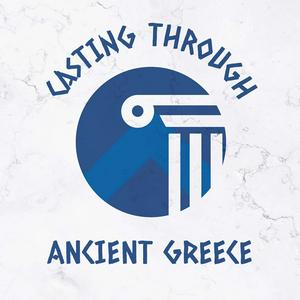135 Episoden
- What if the alliance that crushed Persia had become a lasting settlement? We revisit the brief window after Plataea and Mycale when Greece looked coordinated, and we test a bold idea: Athens commands the sea, Sparta secures the land, and both accept firm limits. From the outside it sounds elegant. Inside the machinery, doctrine, ideology, and economics pull the partnership apart.
We trace why Spartan warfare favored short, decisive campaigns tied to helot stability, while Athenian power thrived on long-haul naval pressure, trade protection, and cumulative influence across the Aegean. Those clashing tempos made joint strategy awkward: one side sought closure, the other needed continuity. Then we tackle freedom itself. Sparta equated liberty with order and control; Athens tied it to participation and autonomy at home and, increasingly, among allies abroad. Each city believed it defended Hellenic freedom, yet each defined it in ways the other found threatening, turning coordination into a contest of values.
Material realities widened the gap. The Piraeus, tribute, and fortified long walls made Athenian security inseparable from projection. Spartan strength remained agrarian and territorial, built for defense rather than maritime governance. Pausanias’s overreach hastened a shift: Sparta withdrew from Ionia as Athens organized the Delian League, converting emergency leadership into durable influence. Could institutions have rescued a dual hegemony—arbitration councils, command rotations, codified spheres? Perhaps in theory, but the polis world resisted supra-city authority, and neither side could reliably practice the self-restraint required.
Across strategy, culture, and political tempo, the same pattern emerges: wartime unity simplified choices; peacetime complexity revived incompatible logics. The result is a clear takeaway for students of ancient history and statecraft alike: alliances can win battles, but only institutions and shared definitions turn victory into order. If you found this exploration useful, follow the show, share it with a friend who loves Greek history, and leave a review with the single reform you think might have saved the partnership.
Support the show
💬 Stay Connected with Casting Through Ancient Greece
Follow us for updates, discussions, and more ancient Greek content:
🌐 Website
📸 Instagram
🐦 Twitter
📘 Facebook
🎙️ Love the show? Don’t forget to subscribe, leave a review, and share it with fellow history enthusiasts. Your support helps keep the stories of ancient Greece alive! - Siege lines rose like ribs around Syracuse, and for a moment it looked inevitable: Athens would seal the city by land and sea and claim a victory to match its ambition. Then a Spartan named Gylippus found an open path, a counterwall bit into Athenian plans, and the balance turned in a single campaigning season.
We walk through the decisive mechanics of the siege: the capture of Epipolae, the fort at Labdalum, and the careful logic of building north and south walls to throttle supply. You’ll hear how targeted Athenian raids shattered early Syracusan counterworks, why the marsh approach to the Great Harbor mattered, and how a split-second battlefield recovery cost the bold general Lamachus his life. Inside Syracuse, morale plunged and talk of surrender spread—until Corinthian ships slipped the net and Gylippus marched overland to reframe the war.
From that point, the terrain of decision shifted. Gylippus struck at Lebdalum, forced Athens to defend too many seams, and completed a counterwall that kept Syracuse connected to the hinterland. Cavalry and javelin men exploited open ground, driving the Athenians back behind incomplete lines. Nicias moved supply points to harbor forts for safer seaborne logistics, but the longer haul to the heights invited harassment, fatigue, and a slow bleed of ship crews and morale. The result was a strategic stalemate tilting toward the defenders.
At the heart of this chapter is Nicias’s stark letter to the Athenian assembly, a rare moment of strategic honesty: withdraw entirely and accept the costs, or reinforce massively with hoplites, cavalry, money, and shared command. No half measures. From the safety of a calm Athens, the choice felt simple—send more. That confidence, nurtured by empire and habit, set the stage for a larger reckoning as Syracuse rallied allies and trained a fleet to contest the last Athenian advantage at sea.
Listen for tactical lessons on siegecraft, counterwalls, and the danger of leaving a single approach unguarded, alongside the political lesson that ambition without mass invites reversal. If this deep dive sharpened your view of the Sicilian Expedition, follow the show, share it with a history-loving friend, and leave a quick review to help others find the series.
Support the show
💬 Stay Connected with Casting Through Ancient Greece
Follow us for updates, discussions, and more ancient Greek content:
🌐 Website
📸 Instagram
🐦 Twitter
📘 Facebook
🎙️ Love the show? Don’t forget to subscribe, leave a review, and share it with fellow history enthusiasts. Your support helps keep the stories of ancient Greece alive! - Victory monuments told one story; Persian strategy told another. We pull back the curtain on how the Achaemenid Empire absorbed defeat at Salamis, Plataea, and Mycale yet remained a decisive force by changing methods, not goals. Instead of chasing glory with grand invasions, Artaxerxes I prioritized containment, stability, and leverage—allowing satraps in Lydia and Phrygia to steady the western frontier while a smaller, cautious fleet protected trade and preserved options.
From there, influence replaced occupation. We dig into the mechanics of Persian soft power: subsidies that traveled faster than armies, patronage that bent city councils, and diplomacy that rewarded neutrality over risk. Athens saw restraint and assumed weakness, expanding across the Aegean under the Delian League. Sparta turned inward, certain the danger had passed. Both misread endurance for absence, creating the very fractures Persia needed to shape outcomes from a distance.
Across the decade after Mycale, the empire learned to turn Greek rivalry into a strategic asset. Gold outlasted galleys, and patience outperformed spectacle. By the mid-fifth century, Persian support and timing influenced wars it never fought, ensuring that no single polis could dominate unchecked. If you’re curious how superpowers pivot after failure—and how soft power, satrapal governance, and maritime caution can reset a geopolitical game—this story offers a clear, surprising blueprint for durable influence.
Enjoy the episode? Follow, share with a history-loving friend, and leave a review telling us where you see this long-game strategy echoed in today’s world.
Support the show
💬 Stay Connected with Casting Through Ancient Greece
Follow us for updates, discussions, and more ancient Greek content:
🌐 Website
📸 Instagram
🐦 Twitter
📘 Facebook
🎙️ Love the show? Don’t forget to subscribe, leave a review, and share it with fellow history enthusiasts. Your support helps keep the stories of ancient Greece alive! - A shocked city, a careful army, and a plateau that decides everything. We follow the tense weeks after Athens’ first win outside Syracuse, when momentum gave way to method. Nicias, often branded cautious, makes a hard strategic choice: pause late in the season, refill the coffers, request cavalry, and prepare for a siege that can actually hold under pressure. Meanwhile, Syracuse hears Hermocrates at last. His blunt case—discipline over bluster, reform over blame—shrinks a muddled command, tightens training, and sends envoys to Corinth and Sparta to turn a local crisis into a panhellenic cause.
The political map of Sicily comes into sharp focus as Camarina keeps a careful distance, Naxos and Regium quietly help Athens, and both sides court allies who can tip supplies, harbors, and morale. Then the war’s center of gravity jumps across the sea. Alcibiades escapes and arrives in Sparta with insider detail and a plan to exploit Athenian overreach. His advice sparks two decisive moves: dispatching Gylippus to steady Syracuse and fortifying Decelea to bleed Attica. Intelligence, timing, and audacity reshape the conflict more than any single skirmish could.
Through winter 415–414 BCE, the Athenians work with rare clarity. Catana becomes an operating base; ships are refit; scouts trace Syracuse’s walls and water. The conclusion is simple and stark: win the Epipolae Heights or lose the siege before it begins. Spring brings speed. A quiet sail, a rapid landing, and Lamachus’ night march seize Euryelus, the gateway to the plateau. Engineers mark lines. Syracuse counters. For a moment, the expedition reaches its high watermark, the city nearly within an encircling wall. But with Gylippus on the horizon and a reformed Syracuse ready to contest every trench, the hard road truly begins.
Support the show
💬 Stay Connected with Casting Through Ancient Greece
Follow us for updates, discussions, and more ancient Greek content:
🌐 Website
📸 Instagram
🐦 Twitter
📘 Facebook
🎙️ Love the show? Don’t forget to subscribe, leave a review, and share it with fellow history enthusiasts. Your support helps keep the stories of ancient Greece alive! - Victory didn’t end the story; it changed the rules. After Mycale and Plataea, the Persian threat receded, the Aegean opened, and a vacuum pulled Athens, Sparta, and Persia into a new contest—one fought with fleets, diplomacy, and competing visions of security. We walk through the decade that followed 479 BC to show how shattered empires, cautious land powers, and ambitious sea powers redrew the map of Greek politics.
We unpack Persia’s strategic shift from invasion to consolidation: naval losses that invited Ionian revolts, satraps scrambling to stabilize Lydia and the Hellespont, and a measured pivot to subsidies and envoys that exploited Greek divisions. On the mainland, we contrast Sparta’s deliberate restraint—defending the Peloponnese, avoiding distant obligations, and prioritizing social stability—with Athens’ awakening to maritime destiny. The Athenian fleet becomes more than defense; it becomes identity, food security, and leverage, soon anchored by the Piraeus and the Long Walls.
At the heart of the story sits the Ionian question: who protects the liberated cities when Persian garrisons fall away? Athens answers with ships and treaties that coalesce into the Delian League—a standing alliance promising collective security while granting Athens command of contributions and strategy. We explore how the League funds naval expansion, extends operations to Cyprus and the Hellespont, and slowly turns cooperation into hegemony. Along the way, we track the emerging fault line with Sparta, as allied poleis navigate between land hegemony and sea hegemony, and Persia watches for fractures to widen.
By the end, freedom has returned to the Aegean, but unity has not. That paradox—liberation without consensus—sets the foundations for the classical Greek order, Athenian naval supremacy, and the rivalries that will define the fifth century. If power abhors a vacuum, this decade shows who rushed in, why they moved, and how their choices reshaped the world. Subscribe, share, and tell us: which decision mattered most—the Spartan retreat, the Athenian fleet, or Persia’s long game?
Support the show
💬 Stay Connected with Casting Through Ancient Greece
Follow us for updates, discussions, and more ancient Greek content:
🌐 Website
📸 Instagram
🐦 Twitter
📘 Facebook
🎙️ Love the show? Don’t forget to subscribe, leave a review, and share it with fellow history enthusiasts. Your support helps keep the stories of ancient Greece alive!
Weitere Bildung Podcasts
Trending Bildung Podcasts
Über Casting Through Ancient Greece
A podcast about the history of ancient Greece for people new to and familiar with Ancient Greek history.The Casting Through Ancient Greece podcast will focus on telling the story of Ancient Greece starting from the pre history through Archaic Greece, Classical Greece and up to the Hellenistic period. Featured throughout the podcast series will be Major events such as the Greek and Persian wars, The Peloponnesian war and Alexander the Greats war against Persia. www.castingthroughancientgreece.com for more resources and creditsSupport the series at www.patreon.com/castingthroughancientgreecefacebook: casting through ancient greeceTwitter: @casting_greece
Podcast-WebsiteHöre Casting Through Ancient Greece, Eine Stunde History - Deutschlandfunk Nova und viele andere Podcasts aus aller Welt mit der radio.at-App

Hol dir die kostenlose radio.at App
- Sender und Podcasts favorisieren
- Streamen via Wifi oder Bluetooth
- Unterstützt Carplay & Android Auto
- viele weitere App Funktionen
Hol dir die kostenlose radio.at App
- Sender und Podcasts favorisieren
- Streamen via Wifi oder Bluetooth
- Unterstützt Carplay & Android Auto
- viele weitere App Funktionen


Casting Through Ancient Greece
Code scannen,
App laden,
loshören.
App laden,
loshören.




































